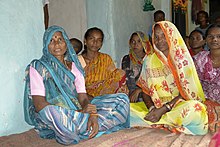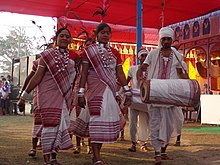
Back آديفاسي Arabic আদিবাসী AS आदिवासी BH আদিবাসী (ভারত) Bengali/Bangla Adivasi Catalan Adivasi German Αντιβάσι Greek Adivasioj EO Adivasi Spanish Ādivāsī ET
This article needs additional citations for verification. (June 2024) |
The Adivasi are heterogeneous tribal groups across the Indian subcontinent.[1][2][3][4] The term is a Sanskrit word coined in the 1930s by political activists to give the tribal people an indigenous identity by claiming an indigenous origin.[5] The Constitution of India does not use the word Adivasi, instead referring to Scheduled Tribes and Janjati.[6] The government of India does not officially recognise tribes as indigenous people. The country ratified the International Labour Organization (ILO) Convention 107 on Indigenous and Tribal Peoples of the United Nations (1957) and refused to sign the ILO Convention 169.[4] Most of these groups are included in the Scheduled Tribe category under constitutional provisions in India.[6]



They comprise a substantial minority population of India and Bangladesh, making up 8.6% of India's population and 1.1% of Bangladesh's,[7] or 104.2 million people in India, according to the 2011 census, and 2 million people in Bangladesh according to the 2010 estimate.[8][9][10][11]
Though claimed to be among the original inhabitants of India, many present-day Adivasi communities formed after the decline of the Indus Valley civilisation, harboring various degrees of ancestry from ancient hunter-gatherers, Indus Valley civilisation, Indo-Aryan, Austroasiatic and Tibeto-Burman language speakers.[12][13][14]
Tribal languages can be categorised into seven linguistic groupings, namely Andamanese; Austro-Asiatic; Dravidian; Indo-Aryan; Nihali; Sino-Tibetan; and Kra-Dai.[15]
Tribals of East, Central, West and South India use the politically assertive term Adivasi, while Tribals of North East India use 'Tribal' or 'Scheduled Tribe' and do not use term 'Adivasi' for themselves.[16] Adivasi studies is a new scholarly field, drawing upon archaeology, anthropology, agrarian history, environmental history, subaltern studies, indigenous studies, aboriginal studies, and developmental economics. It adds debates that are specific to the Indian context.[17]
- ^ Engin F Isin (2015). Citizenship After Orientalism: An Unfinished Project. Taylor & Francis. p. 213. ISBN 978-1-317-68137-3. Archived from the original on 23 March 2023. Retrieved 23 March 2023.
Widely addressed as tribals, Adivasis are heterogeneous groups spread all over the nation having different languages and group identities.
- ^ Isin, Engin (2016). Citizenship after Orientalism: Transforming Political Theory. Palgrave Studies in Citizenship Transitions. Palgrave Macmillan UK. p. 202. ISBN 978-1-137-47950-1. Archived from the original on 23 March 2023. Retrieved 12 April 2023.
'Adivasi' literally means 'original inhabitant', and it refers to heterogeneous adivasis tribal groups living all over the subcontinent.
- ^ Cite error: The named reference
EB_Adivasiwas invoked but never defined (see the help page). - ^ a b Rousseleau, Raphael (7 February 2013). "Claiming Indigenousness in India". Books & Ideas. Archived from the original on 21 January 2021. Retrieved 30 September 2022.
- ^ Cite error: The named reference
barnes1995was invoked but never defined (see the help page). - ^ a b Cite error: The named reference
Forwardpresswas invoked but never defined (see the help page). - ^ "Bangladesh – The World Factbook". Cia.gov. Archived from the original on 30 July 2021. Retrieved 10 July 2021.
- ^ "2011 Census Primary Census Abstract" (PDF). Censusindia.gov.in. Archived (PDF) from the original on 5 August 2020. Retrieved 11 June 2015.
- ^ "SCs, STs form 25% of population, says Census 2011 data – Indian Express". archive.indianexpress.com. Archived from the original on 16 July 2017. Retrieved 25 April 2015.
- ^ "CPI(M) demands reservation for SCs, STs in private sector". DNA India. 16 April 2015. Archived from the original on 14 July 2019. Retrieved 14 July 2019.
- ^ "Bangladesh | World Directory of Minorities & Indigenous Peoples". Minority Rights Group. 19 June 2015. Archived from the original on 10 July 2021. Retrieved 10 July 2021.
- ^ Reich et al. 2009.
- ^ Basu et al. 2016.
- ^ Narasimhan, Patterson & et al. 2019.
- ^ Cite error: The named reference
bucketwas invoked but never defined (see the help page). - ^ Dasgupta, Sangeeta (2018). "Adivasi studies: From a historian's perspective". History Compass. 16 (10). doi:10.1111/hic3.12486. Retrieved 7 June 2024.
- ^ Sangeeta Dasgupta, "Adivasi studies: From a historian's perspective." History Compass 16.10 (2018): e12486 doi:10.1111/hic3.12486